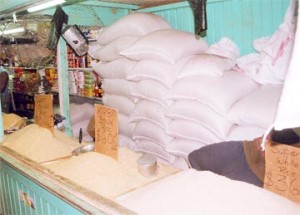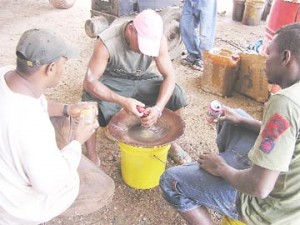Gold could fare better
The dependence of key Guyana exports including sugar, rice, bauxite, gold and wood products on “a few traditional markets in Europe and North America” has created a “trade vulnerability” that could adversely affect the Guyana goods sector in the light of the global financial crisis,” says Caricom Secretariat Economic Adviser Dr. Maurice Odle.
Ogle’s prediction regarding the challenges that Guyana’s “real sector” could face as the US economy hovers on the brink of recession was made at a forum convened by the Georgetown Chamber of Commerce and Industry (GCCI) on Monday, October 27 to discuss the global financial crisis and its implications for the Guyana business community.

According to Odle the local sugar industry’s likely “woes” arising out of the global financial crisis “will come on top of the revenues lost from the EU’s renouncing of the sugar protocol” while “rice exports will be adversely affected by both global and regional demand.” According to Odle, in the case of bauxite and wood products “the slowdown by Russia, China and South East Asia may cause a significant reduction of demand. Similarly, the export of seafood will decline as a result of depressed global demand and a serious shortfall in tourist arrivals and our fledgling eco-tourism industry will take a lot longer to take off,” he added.
Odle told the forum that gold could be the exception to the likely downward trend in exports since, he noted, gold prices “tend to rise significantly when there is uncertainty in the global economy and fluctuation in financial and currency markets.” Ogle also noted that the fall in petroleum prices “is important from the point of view of cost efficiency of non-producers like Guyana,” while “the price of imported building materials and household equipment may fall as a result of the collapse of the house-building industry in the USA.”
The Guyanese economist also expressed concern over what he says is likely to be a contraction in the flow of remittances to Guyana arising out of the current crisis. Noting that the majority of the approximately $US424m in remittances to Guyana last year – representing “as much as 43 per cent of GNP – came from the United States, Dr. Odle opined that the likely reduction in remittance flows was a further factor that could impact on the Guyana economy. “Since remittances are primarily out of income earned, the severe downturn centering around the USA, the main destination of the Diaspora, will have an almost immediate impact and is likely to persist beyond the period of the recession until asset items foregone are acquired by the metropolitan-based remitters,” Dr, Odle said.

The Guyanese economist also expressed concern that, arising out of the current global financial crisis the Guyana economy could also experience a reduction in inward investment flows which he said averaged nearly $US100m over the past three years. “Large projects involving a considerable financial outlay are likely to be the ones most affected although ongoing projects would tend to be continued until the completion stage,” he added.
Alluding to the implications of the global financial crisis for the local banking sector Dr. Odle told the forum that the direct impact is likely to be negligible since local commercial banks and other institutional investors “are not holders of the toxic mortgaged-based securities which have depreciated in value.” He noted too that the local banking sector does not include branches or “stand alone subsidiaries” of the worst hit foreign banks.
However, Odle told the GCCI forum that there was a danger that the global financial crisis could trigger a greater tendency towards risk-aversion by the local banking sector. This, he said, could cause commercial banks to “gravitate towards holding more liquid assets and fixed income government securities and away from start-up ventures and the more risky activities that lack assured outcomes or adequate collateral.”
And according to Odle “a lack of sufficient disclosure and transparency” in the insurance sector made it difficult to determine “whether any toxic mortgage-backed securities are being held locally.” He added, however, that it was possible that some major commercial, industrial and public utilities assets are insured by the badly ailing United States company American International Group.
Despite his stated concerns over the likely impact of the current global financial crisis on the Guyana economy, however, Dr. Odle said that local “institutional investors” could realize an “unexpected benefit” from the crisis.
“Insurance companies, pension funds, investment banks and mutual funds that experience a fall in income on foreign held assets might want to hold a greater proportion of local or regional assets with spin-off benefits for local capital market investment,” Odle said.





